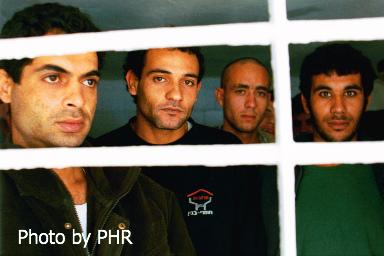Supreme Court Upholds Sheikh Ra'ed Salah Travel Ban Following Closed Meetings with GSS
On Monday, 10 June 2002, the Supreme Court began hearing a petition challenging the travel restrictions imposed on Sheikh Ra'ed Salah, the head of the Islamic Movement in Israel. Adalah filed the petition on behalf of Sheikh Ra'ed Salah, Al Meezan Association for Human Rights, and in its own name, against the Minister of Interior, Eliyahu Yishai, on 3 June 2002. The petitioners asked that the Court declare the Minister's order of 16 February 2002, prohibiting Sheikh Ra'ed Salah from traveling outside the country for a period of six months, unconstitutional and void.
On Monday, 10 June 2002, the Supreme Court began hearing a petition challenging the travel restrictions imposed on Sheikh Ra'ed Salah, the head of the Islamic Movement in Israel. Adalah filed the petition on behalf of Sheikh Ra'ed Salah, Al Meezan Association for Human Rights, and in its own name, against the Minister of Interior, Eliyahu Yishai, on 3 June 2002. The petitioners asked that the Court declare the Minister's order of 16 February 2002, prohibiting Sheikh Ra'ed Salah from traveling outside the country for a period of six months, unconstitutional and void.
At the Supreme Court hearing, Attorney Hassan Jabareen, General Director of Adalah, put forward three principal arguments for declaring the restriction order void:
- The Minister of Interior issued the order based solely on secret evidence, without giving Sheikh Ra'ed Salah the opportunity to challenge the order or the Minister's claims that his travel outside the country would constitute a threat to state security.
- The order completely denies Sheikh Ra'ed Salah's right to travel outside the country for a long period of time, regardless of the destination or purpose of his travel. Thus, the restriction on Sheikh Ra'ed Salah's movement is overbroad and unreasonable. It fails to satisfy the test of proportionality.
- In a case which involves such broad travel restrictions, the right to a fair hearing requires that the facts of the case be subject to a thorough and comprehensive examination. The Minister did not satisfy this requirement before imposing the restriction order on Sheikh Ra'ed Salah.
Further, Adalah requested that the Court issue an immediate injunction to allow Sheikh Ra'ed Salah to travel to Mecca, Saudia Arabia, for two weeks, beginning 14 June 2002, in order to allow him to complete al-Umra pilgrimage. There is no reason not to allow Sheikh Ra'ed Salah to complete his pilgrimage, Adalah argued, as the destination and time period of his travel are clear, and the purpose of the trip, to satisfy a religious obligation, is legitimate. Hassan Tabaja, Advocate, of Al Mezan Center for Human Rights explained the significant religious meaning of al-Umra pilgrimage to the Supreme Court.
The petition was heard by a three-judge panel composed of Justices Yakov Tirkel, Ayala Procaccia and Edmond E. Levy. After hearing Adalah's arguments, the panel of judges met in camera with representatives of the General Security Services (GSS) for one hour before delivering their initial ruling on the case.
The Court stated that, according to the secret evidence, Sheikh Ra'ed Salah intends to meet with an enemy of the state during his travels, though the Justices would not identify the alleged enemy. Adalah denied that Sheikh Ra'ed Salah had planned such meetings. The Court rejected the request for injunction, and thus prohibited Sheikh Ra'ed Salah from traveling to Mecca. However, the Court instructed Adalah to submit an appeal to the Minister of Interior, to which the Minister must respond within seven days. Following the Minister's response to Adalah's appeal, the Supreme Court may hold a second hearing on the petition.
















 Adalah Press Release, "Adalah Files Petition to Supreme Court: Travel Restriction on Sheikh Ra'ed Salah is Unconstitutional,"
Adalah Press Release, "Adalah Files Petition to Supreme Court: Travel Restriction on Sheikh Ra'ed Salah is Unconstitutional," 